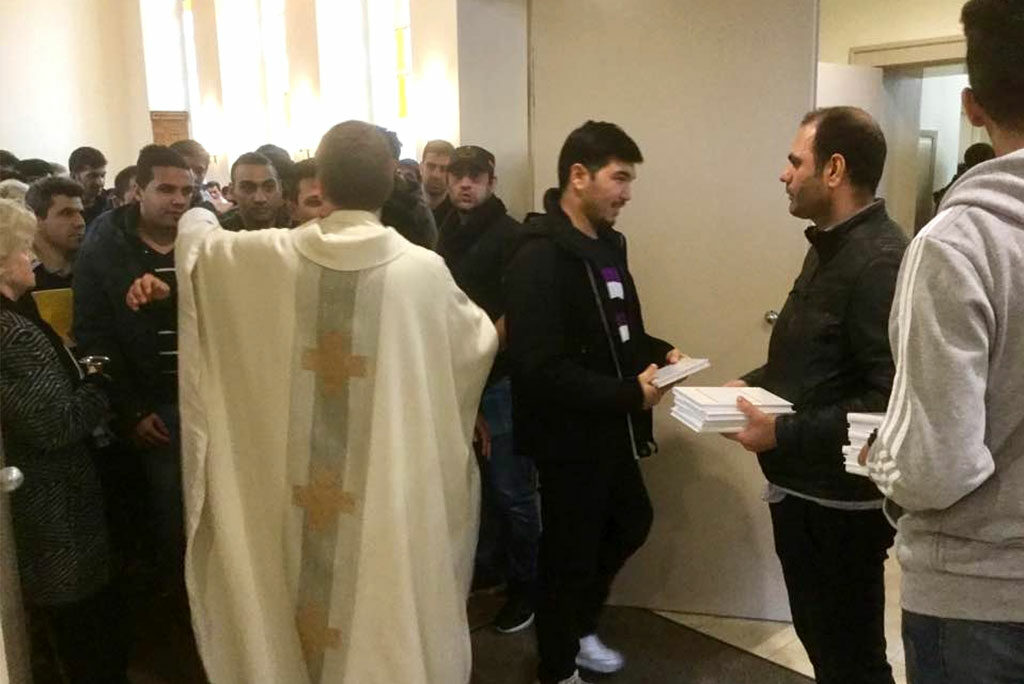
By Jennifer Bagnall
“Our church is packed — packed with refugees speaking a different language. It is quite a challenge for the locals. How do you teach people about our faith when they don’t know the language at all?” asks the Rev. Hugo Gevers, pastor at Trinity Lutheran Church in Leipzig, Germany. “It’s a big, big problem.”
Now Gevers has an important new tool for sharing the Good News with his Iranian immigrant parishioners: Luther’s Small Catechism, translated and published in the Farsi language by the Lutheran Heritage Foundation (LHF).
The Farsi Small Catechism is LHF’s 80th translation of this cornerstone of the Lutheran faith, and it’s easy to see why Martin Luther’s little book continues to be the key to opening Scripture.
“For many new Christians, the Bible’s hundreds of pages can seem overwhelming,” said LHF Executive Director Rev. Matthew Heise. “Like the Ethiopian eunuch, they ask, ‘What does this mean?’ The catechism boils down the Scriptures’ key teachings — mankind’s sinful state, God’s love and grace, the life of a Christian — in a way that’s easily understandable for a new believer.”
The need for Farsi teaching materials has been overwhelming for the LCMS partner church in Germany (the Independent Evangelical Lutheran Church [SELK]), where tens of thousands of Iranian asylum-seekers have poured into the country.
Over the past year, Gevers has baptized more new believers than he had in the previous nine years combined. Almost all of those baptized have been Iranians and Afghans seeking political asylum.
“We are in a situation exactly as when Martin Luther wrote the catechism back in 1529,” Gevers said. “Just as in Luther’s day, we have a lot of people being baptized in various [other than SELK] churches and going to Holy Communion, but they don’t even know what they’re receiving. We need the catechism to work with the Iranian people, to give them the basic knowledge of the Bible and the Christian faith in a nutshell.”
Of course, whether the refugees are sincere in their faith or simply trying to attain political asylum is a question that often arises.
“We know that there are some who are spying on us,” said Gevers. “But we cannot allow this distrust to influence the way we work with them. We are not trusting in human strength, but in God’s message — which is what changes the heart. So if he is a spy or a staunch Muslim, then he needs the message just as much as I do.”
The cover of the Farsi Small Catechism reflects this philosophy.
“The illustration shows a man sowing the seed,” Gevers explained. “It’s very fitting to the situation, because we are sowing and sowing and sowing. But God is making the seed grow. So it is with this catechism. We are sowing the seeds of biblical teaching.”
Though the 6,000 copies LHF published are being primarily distributed in Germany, there are also significant Farsi‐speaking populations in the United States, Denmark and Scandinavia where the catechisms also will be shared. As with all of LHF’s books, the Farsi Small Catechism is available free of charge to the pastors, churches and individuals who need them.
“We also shouldn’t underestimate how this message is reaching into Iran,” Heise speculated. “Though Iran is over 99 percent Muslim, we know there is a growing underground Christian church there. I wouldn’t be surprised if some of these catechisms make their way to the underground church as some of the refugees return to Iran. What a miracle it’s been to see this simple, but profound, little book shine the light of Jesus Christ into the darkest corners of Islam!”
An LCMS Recognized Service Organization, LHF has translated and published books of the Lutheran faith into more than 90 languages. To request a Farsi Small Catechism or to see what other books LHF has printed in the languages of the world, visit LHFmissions.org or call 800-554‐0723. A gift of $5 helps cover the costs of printing and shipping a Farsi catechism and enables LHF to continue in its mission.
Jennifer Bagnall (jbagnall@lhfmissions.org) is director of Public Relations for Lutheran Heritage Foundation
Posted December 5, 2016